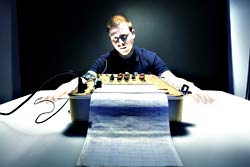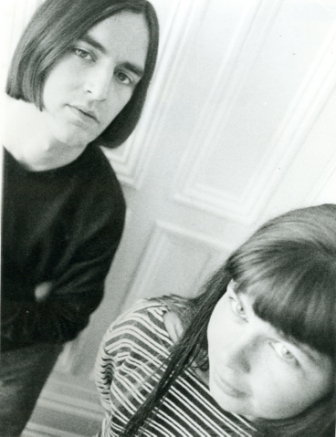El-P’s new, second proper solo rap album, I’ll Sleep When You’re Dead, opens with an eerie sound bite of the Twin Peaks character Laura Palmer asking her friend Donna Hayward, “Do you think that if you were falling in space, that you would slow down after awhile or go faster and faster…faster?”
Using a phrase spoken by an elusive main character who mysteriously dies shortly after saying it really puts the album’s “shit will happen and it ain’t gonna be pretty” tone into perspective. El-P’s production on I’ll Sleep When You’re Dead is no less heavy or abstract than on his last album, 2002’s Fantastic Damage. But there’s something to the lyrics that feels a level darker, more disturbing, and painfully true. Each line reflects the recent past and America’s current material obsessions, and details the possible future of a totalitarian-ruled dystopia, entangled in personal, political, and social conflict.
One doesn’t have to be immersed in political affairs to understand how much this country has changed since Bush came into office, when the fate of America was first cast at the mercy of the scrupulous, dim-witted decider. We all remember that one day in 2001 that changed every American’s life. It was only six years ago, but considering what’s gone down since then, it seems like an eternity.
“There are people that see the end of the world every day,” says El-P, whose real name is Jaime Meline. “I kind of felt that when watching the twin towers fall from my rooftop.”
To many, that day plays over and over, like a constant looping scene from an apocalyptic action movie that can’t be stopped or fast-forwarded through. High in the sky, we watched planes crash into and flames shoot out of the sides of two of America’s most well-known buildings—symbols of a democratic and rich land. Many innocent, desperate people in those buildings dropped out of the sky like anvils, before the heat weakened the buildings’ skeletal frame structure and brought them down, suffocating the city that never sleeps in an ashy cloud.
Seeing the World Trade Center fall was a nightmare in real time, and the thoughts, emotions and theories about what happened stirred in El-P’s rigid, convoluted mind as he penned lyrics to Fantastic Damage shortly after the event. It was his first solo outing since the dissolution of his former group, Company Flow. Lyrically and symbolically, Fantastic Damage was incredibly immediate, where the future as we knew it was divulged through the destructive, hard-hitting beats and angry, technical rhymes. This was perhaps most visibly apparent in the following couplet from the song “Accidents Don’t Happen”:
“Flight of the accidental tourist, morbid/The advertising Gods so oddly courtship/Godly corporate squads plot these tortures/Holiness is hard and it’s costing God fortunes/Guess he took a second job on the force to afford it/I don’t want a part of these self-fulfilled prophecies/Man it’s too much for my stubbornness, I hate the people running shit/Now if you sleep at ground o below, wishing you peaceful sleep.”
It’s strange to think that five years have passed since El-P put those words to use. America has changed dramatically in that time. We’re embattled in an unpopular war. Each day, we’re lied to, and our freedoms face tighter restrictions. It’s almost like more harm has been caused in such time than at any other time in history, and everything we hoped wouldn’t happen has. But every word and verse from Fantastic Damage has remained strikingly relevant and immediate, still fresh and charged.
“All I can do is write my own story,” he says. “If I can write my story well, I hope that as a consequence, it writes your story. The details might change, but the story is the same.”
On top of the usual cast of Def Jux luminaries, El-P has paired with a handful of notable musicians on I’ll Sleep When You’re Dead, including Trent Reznor, Cat Power, and the Mars Volta dudes. Reznor, who contributes the hook to “Flyentology,” stands out as the least subtle of them all—though nothing is particularly distracting from El-P’s ceaseless current of electric rhymes and high-voltage beats. And El-P even opens himself up on a very emotional and personal level on “The Overly Dramatic Truth,” spitting melodic verse after melodic verse.
“I’m in the struggle of how much of myself I should expose,” he says. “Ego doesn’t allow you to expose yourself. I don’t know anything more than anyone else, and I’m not any better a person than anyone else. I just like to document the internal struggles. Those are the essence of what we’re about. All you’re hearing is my personal search. I’m not an activist, or there to inspire or help somebody. I’m just trying to make sense out of my own mind.”






